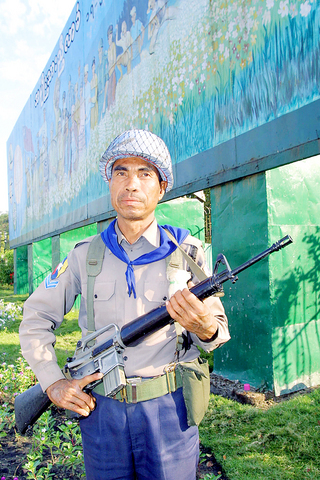With Myanmar's military junta facing increasing international isolation, Prime Minister Soe Win heads to China this week expecting to expand ties with his nation's strongest and most loyal ally.
Even as Myanmar's fellow Southeast Asian neighbors show growing signs of unhappiness over the regime's political and human rights records, China has remained solidly behind the generals while looking to broaden trade links.
"We expect that this visit will further expand and deepen the traditional friendship between China and Myanmar," Chinese Foreign Ministry Spokesman Kong Quan (

PHOTO: AFP
Kong said the two nations would sign trade agreements during Soe Win's four-day trip, while he is scheduled to receive red carpet treatment during meetings with Chinese President Hu Jintao (
However the UN's former envoy to Myanmar, Razali Ismail, called on China to start pressuring the junta to reform.
"China has a critical role to play in the efforts to bring reforms and democracy in Myanmar," said Razali, a Malaysian diplomat who resigned in frustration in December after being denied access to the country for two years. "The Chinese know if they exert the political will, they can get Myanmar back on the track towards reforms. China is extremely close with Myanmar."
China, however, has given no indication it will encourage the junta to reform, with Kong insisting his government will not deviate from its strict policy of not interfering in Myanmar's "internal affairs."
Ralph Cossa, director of the Pacific Forum think tank at the Center for Strategic and International Studies, said China's stance had become more important for the junta as other regional governments abandoned them.
For a long time, ASEAN had followed a similar policy of "non-interference" with member Myanmar, but last year demanded it move towards democracy and release opposition leader Aung San Suu Kyi.
"China has become not only an important economic contributor, but also its political protector," Cossa said.
Cossa said this support had become "critical" in multilateral forums, with China lobbying other nations privately and publicly to avoid placing pressure on Myanmar's generals.
"You see the Chinese at every one of these meetings speaking out for Myanmar. No one else is carrying the flag for them. Politically it helps to take some of the heat off Myanmar," he said.
The US said last week it was considering introducing a resolution at the UN Security Council to step up international pressure on Myanmar over rights abuses.
China, a permanent member of the Security Council, would likely veto any such move, with Myanmar so confident of the fact that Soe Win would not even raise the matter this week, a former Thai ambassador to the UN said.

Yemen’s separatist leader has vowed to keep working for an independent state in the country’s south, in his first social media post since he disappeared earlier this month after his group briefly seized swathes of territory. Aidarous al-Zubaidi’s United Arab Emirates (UAE)-backed Southern Transitional Council (STC) forces last month captured two Yemeni provinces in an offensive that was rolled back by Saudi strikes and Riyadh’s allied forces on the ground. Al-Zubaidi then disappeared after he failed to board a flight to Riyadh for talks earlier this month, with Saudi Arabia accusing him of fleeing to Abu Dhabi, while supporters insisted he was

‘SHOCK TACTIC’: The dismissal of Yang mirrors past cases such as Jang Song-thaek, Kim’s uncle, who was executed after being accused of plotting to overthrow his nephew North Korean leader Kim Jong-un has fired his vice premier, compared him to a goat and railed against “incompetent” officials, state media reported yesterday, in a rare and very public broadside against apparatchiks at the opening of a critical factory. Vice Premier Yang Sung-ho was sacked “on the spot,” the state-run Korean Central News Agency said, in a speech in which Kim attacked “irresponsible, rude and incompetent leading officials.” “Please, comrade vice premier, resign by yourself when you can do it on your own before it is too late,” Kim reportedly said. “He is ineligible for an important duty. Put simply, it was

The Chinese Embassy in Manila yesterday said it has filed a diplomatic protest against a Philippine Coast Guard spokesman over a social media post that included cartoonish images of Chinese President Xi Jinping (習近平). Philippine Coast Guard spokesman Jay Tarriela and an embassy official had been trading barbs since last week over issues concerning the disputed South China Sea. The crucial waterway, which Beijing claims historic rights to despite an international ruling that its assertion has no legal basis, has been the site of repeated clashes between Chinese and Philippine vessels. Tarriela’s Facebook post on Wednesday included a photo of him giving a

Syrian President Ahmed al-Sharaa on Sunday announced a deal with the chief of Kurdish-led forces that includes a ceasefire, after government troops advanced across Kurdish-held areas of the country’s north and east. Syrian Kurdish leader Mazloum Abdi said he had agreed to the deal to avoid a broader war. He made the decision after deadly clashes in the Syrian city of Raqa on Sunday between Kurdish-led forces and local fighters loyal to Damascus, and fighting this month between the Kurds and government forces. The agreement would also see the Kurdish administration and forces integrate into the state after months of stalled negotiations on